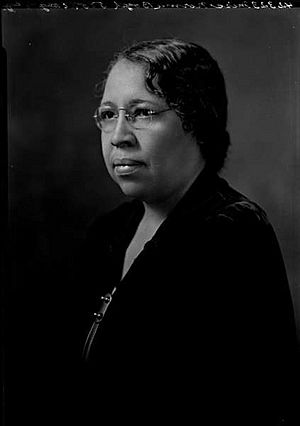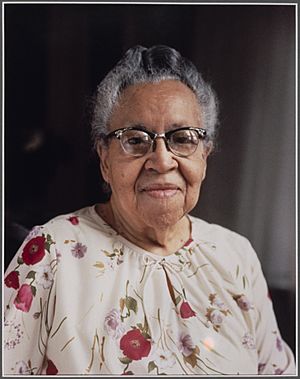Norma Elizabeth Boyd facts for kids
Quick facts for kids
Norma Elizabeth Boyd
|
|
|---|---|

Norma Elizabeth Boyd
|
|
| Born | August 9, 1888 |
| Died | March 14, 1985 (age 96) |
| Occupation | founder of Alpha Kappa Alpha Sorority, Incorporated; educator; civic activist |
Norma Elizabeth Boyd (born August 9, 1888 – died March 14, 1985) was a very important woman. She was one of the sixteen founders of Alpha Kappa Alpha, the first sorority created by African-American women at Howard University. She also helped make the sorority an official organization in 1913. This sorority has been helping communities for over 100 years!
Norma Boyd worked as a teacher in Washington, D.C. public schools for over thirty years. She showed her students how the government worked by taking them to important meetings in Congress. She was one of the most active founders of Alpha Kappa Alpha in politics, caring about issues both in the U.S. and around the world.
In 1938, Boyd started the Non-Partisan Council. This was the first group representing minority communities to speak directly to the United States Congress. Because of her hard work with this council, she was named "Woman of the Year in the Field of Legislation" in 1948. This award came from the National Council of Negro Women.
Boyd was involved in many different groups, especially those that worked on international issues. She was even chosen as a United Nations observer. This meant she represented the United States on several committees and at a big meeting in Brazil.
Template:TOC limit=3
Contents
Early Life and Education
Norma Boyd grew up and went to public schools in Washington, D.C.. In September 1906, she started at Howard University's College of Arts and Sciences. She chose to study math. Howard University was the best historically black college in the country at that time. Not many people went to college back then. Only a tiny number of African Americans and a small percentage of white people attended college. Boyd earned her Bachelor of Arts degree in 1910.
Career as an Educator
Norma Boyd loved learning throughout her life. She took many advanced courses in education and public relations at different universities. These included Columbia University, New York University, and the University of California at Berkeley. She also studied at Middlebury College in Vermont, the National Autonomous University of Mexico, American University, and George Washington University.
For more than thirty years, Boyd taught in public schools in Washington, D.C. She believed in teaching her students about how government works. She would often take student council officers to congressional hearings. This helped them learn about the political process firsthand. She stopped teaching in 1948.
Founding Alpha Kappa Alpha
Starting the Sorority
At Howard University, Norma Elizabeth Boyd was one of seven students who joined Alpha Kappa Alpha Sorority in February 1908. She was even the president of the Alpha chapter two different times.
Later, some members decided to leave and start a different sorority. But Boyd, along with Nellie Quander, Julia Evangeline Brooks, Minnie B. Smith, Nellie Pratt Russell, and Ethel Jones Mowbray, officially made Alpha Kappa Alpha a legal organization on January 29, 1913. The members who left formed another sorority called Delta Sigma Theta Sorority.
Boyd's Role in the Sorority
In 1913, Boyd was the corresponding secretary for Alpha Kappa Alpha's first leadership team. She also led the North Atlantic Region of the sorority. Boyd helped start the Xi Omega chapter in Washington, D.C., and served as its president. In 1934, she helped raise money for the first year of Alpha Kappa Alpha's Mississippi Health Project. This project helped people get medical care.
During World War II, Boyd organized two important meetings at Howard University. One was about "Labor and Women in the War Effort," and the other was "Defense Planning for the Future." These events helped people think about how to support the war effort.
The Non-Partisan Council
We can ask for and support such measures as will assure for our people decent living conditions, permanent jobs, and a voice in determining the conditions under which they live and work. We can effect these objectives only by making our power felt in the halls and floors of Congress, and activity toward this end begins with participation in the primaries of our land.
In 1938, Boyd created the "Non-Partisan Lobby for Economic and Democratic Rights" (NPC). This group worked to convince Congress to pass laws that would help African-Americans. They focused on issues like public service, education, voting rights, and jobs. Later, the NPC also worked on other civil, social, and political issues.
The NPC carefully looked at all new bills (proposed laws) in Congress. They would then share their thoughts with Congress when needed. The Non-Partisan Council also helped expand programs that created jobs. They also supported a minimum wage for laundry workers and helped continue the American Youth Act.
During World War II, the council pushed for civil rights laws. The Non-Partisan Council also talked to government groups like the Department of State and the United Nations. They wanted to make sure these groups knew about the need for integration and equal rights. The organization lasted for ten years and was officially closed on July 15, 1948.
The Non-Partisan Council worked with many other important groups. These included the NAACP, The Urban League, and the Brotherhood of Sleeping Car Porters. For her great work in starting and leading the Non-Partisan Council, Norma Boyd was named "Woman of the Year in the Field of Legislation" in 1948. This award came from the National Council of Negro Women.
Working with the United Nations
Norma Boyd became an observer for the United Nations in 1949. This meant she could attend meetings and share her views. She was part of several committees, including one that advised the American delegate to the Inter-American Council of Women.
In 1949, Boyd traveled to South America. She was an observer at the Inter-American Commission of Women meeting in Buenos Aires, Argentina. At this meeting, she represented several non-government organizations. While in Brazil, Boyd also helped start a chapter of International House.
As a UN observer, Boyd cared a lot about children's rights. She supported Principle 10 of the Declaration of Human Rights, which is about human dignity. To help her students learn, one year Boyd paid for twenty-five of them to visit the United Nations' General Assembly in New York City.
Later Life and Legacy
In 1959, Boyd started the Women's International Religious Fellowship. This group brought together women from different backgrounds and cultures. They worked to highlight the importance of children's safety and rights.
Norma Boyd traveled widely during her life. She visited cities across the United States, Canada, Mexico, South America, and the British West Indies. She also wrote her autobiography, called A Love that Equals My Labor. Norma Elizabeth Boyd was the last living founder of Alpha Kappa Alpha (AKA). She passed away in Washington, D.C. on March 14, 1985, at the age of 96.
Other Organizations and Activities
Boyd was a member of many different organizations:
- Professional groups: She was part of the National Council of Mathematics Teachers and the American Federation of Teachers.
- International groups: She was involved with the International Committee of the Temple of Understanding and the Women's International League for Peace and Freedom.
- Political groups: She founded the Non-Partisan Council and was active in the East-West Association.
Boyd was also the president of the International House Association in Washington, D.C. From 1958 to 1959, she led the World Fellowship Inter-Faith Committee at All Souls Church, Unitarian, of Washington, D.C..
See also
 In Spanish: Norma Elizabeth Boyd para niños
In Spanish: Norma Elizabeth Boyd para niños
- List of peace activists
 | Misty Copeland |
 | Raven Wilkinson |
 | Debra Austin |
 | Aesha Ash |


